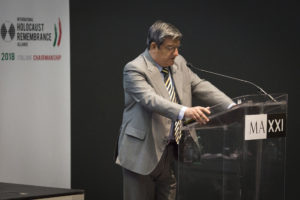INTERNATIONAL HOLOCAUST REMEMBRANCE ALLIANCE “Among the Different Forms of Discrimination, anti-Semitism is Specific and Peculiar”
 The following is the speech given by Ambassador Sandro De Bernardin on the occasion of the Conference ‘The Racial Laws: Before and After the Shoah: Models, Practices and Heritage’.
The following is the speech given by Ambassador Sandro De Bernardin on the occasion of the Conference ‘The Racial Laws: Before and After the Shoah: Models, Practices and Heritage’.
Distinguished guests,
I welcome you to this Conference, that takes place on the day when the Giro d’Italia ends in Rome arriving from Jerushalaim, “the City of Peace”. It is a good omen for a meeting aimed at improving understanding of the reasons why too many people were (and are) denied peace on racist grounds.
When I was Ambassador in Israel, I got acquainted with the then President of the Israeli Supreme Court, Aharon Barack. He once told me: “You know, Ambassador, I see my mission as that of the supreme guarantor against the risk of arbitrary ruling of the majority against the minority”.
What a sublime definition of the rule of law and of the role of its servants!
And what an enormous difference compared to the behaviour and the moral background of those who wrote and implemented racial laws.
I have always been struck by the variety of theoretical assumptions used to justify racism, and by the fact that they often contradict each other.
The Fascist “Manifesto della Razza” of 15 July 1938 states “The concept of race is purely biological” (para. 3).
On the contrary, Hitler’s idea was that “from a genetic standpoint, there is no Jewish race. … The Jewish race is above all a community of the spirit”. (Hitler’s Table Talks, 13 February 1945).
In sum, racism cannot be easily defined.
Today racism is often stronger in societies where foreigners are less numerous. Does this mean that racism has to do with the fear of what is unknown, of what is different?
Racism can be generated by fear, or ignorance, or manipulation. But in my view, there is more to racism than this.
Racism can be mystic when it is based on a perception of superiority.
Racism can be utilitarian if it is aimed at affirming a national interest.
Racial discrimination has also been linked to the concept of Lebensraum, living space. That is: mors tua, vita mea ! Even in his last days in his Berlin Fuhrerbunker, Adolf Hitler elaborated on the incompatibility between the survival of Jewish people and the survival of German people (Hitler’s Table Talks, 24 February 1945). “Should we lose the war, – he said to Martin Bormann – it would mean that we have been defeated by the Jews”.
For his part Mussolini explained – in a speech delivered on 18 September 1938 in Trieste – that racism was made necessary by colonial conquests in Africa, since (I quote): “empires are conquered by weapons and they are kept by prestige; we need a strong racial consciousness which states not only the differences but also the very clear superiorities.
So much for the need to be racist towards the natives of African colonies. But how does this apply to Italian Jews? to Italian citizens ?
The fact is that – among the different forms of discrimination – antisemitism is a specific and peculiar form. Antisemitism is not only about racism.
In any case, we have learnt that persecution often begins with Jews, but rarely stops with Jews.
And we have learnt that, whatever its origin, the result of racism is always the same: devastation of the society. Devastation not only for those who are the immediate victims, but for the dignity and future of the whole social body.
Even more so since – as Zygmunt Bauman denounced – progress makes it more difficult to behave in a moral way because it widens the distance between us and the final effect of our behaviour, thereby sterilizing our perception of personal responsibility. The way in which so many respectable citizens helped in implementing racial laws in Italy is a case in point.
Ladies and gentlemen,
The International Holocaust Remembrance Alliance is dedicated to the process of researching the uncovered shadows of the Holocaust. The consequences of the Holocaust can still be felt today and therefore it is our responsibilities to properly understand its origin.
That is why the Italian Chairmanship of the IHRA is really grateful to the organizers and the speakers of this Conference.
Running through premises, models and practices of racial legislations, this meeting can contribute to a better understanding of the issue, which remains of paramount importance to this day.
Indeed, if one speaks of the wish not to have history repeat itself, the current evolution and the growing tendency to have anti-foreigner legislations in many countries should also be observed through the lens of what existed before WWII.
I really hope this conference can contribute to spreading a simple message: when you hear the sound of the bell of discrimination, “never send to know for whom the bell tolls. It tolls for thee” (John Donne, Devotions upon Emergent Occasions).
Thank you.
